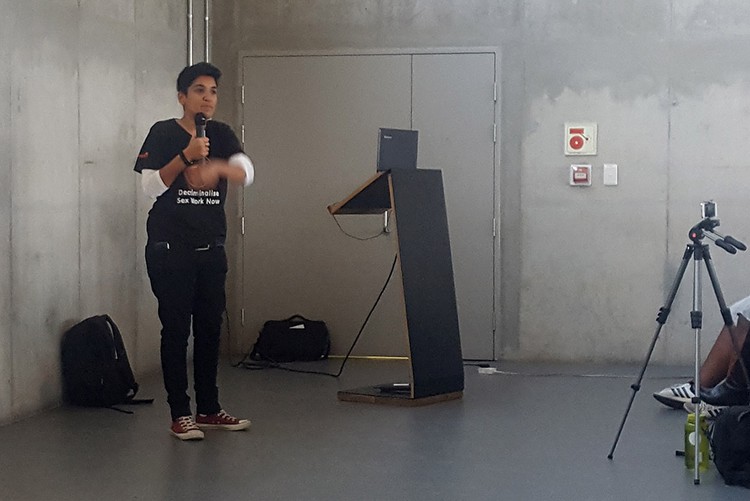“Most sex workers are mothers”
School fees paid from sex work
Most sex workers in SA are mothers using the money from their work to provide for their families, yet the law makes them into criminals, Ishtar Lakhani of Sex Workers Education and Advocacy Taskforce (SWEAT) told a workshop in Khayelitsha on Friday.
About 60 residents from Khayelitsha, Philippi and other townships were attending the second day of the Social Justice Coalition’s third annual Policing and Social Justice Dialogue Series at the Isivivana Centre in Khayelitsha. The day opened with Lakhani presenting “Sex worker and policing – human rights challenges”.
In 2015, it was estimated that there could be “between 131,000 and 182,000 sex workers in South Africa, or between 0.76 and 1 % of the adult female population”.
“It is a crime to sell sex in SA. It is a crime to buy sex in SA,” said Lakhani. “A majority of sex workers in this country are mothers; a majority of sex workers in this country use their money to provide for the family. So the law says that all those who live off that money are all criminals. So now let’s talk about how police enforce that law. How are you going to arrest a child going to school when the school fees are paid from sex work?”
“Today, you have a population of very vulnerable people who aren’t able to go to the police, who aren’t able to report crimes, who aren’t able to go to clinics, because the law says the work that they do to provide for their families is criminal,” said Lakhani.
She said police abuse of sex workers was a national problem. Sex workers dealt with torture, rape and assault, bribes, corruption, and unlawful arrests in their line of work. SWEAT received many complaints from sex workers about their treatment at the hands of police, Lakhani said.
An audience member, Mosuli Qhaba, said police should not violate people’s rights. “I support sex work and I advocate for sex work because I am also interested in buying sex. So if I want to buy sex then I should be able to, same as if someone wants to sell sex, they should be able to.”
Musawenkosi Ngcingane, also in the audience, said he did not understand the concept of sex work and why people were doing it, but nonetheless felt that sex workers should be protected by the law.
Another member of the audience, Siphiwe Tofile, said, “We should not discriminate and judge people who choose to do sex work, because there are women out there who ask for money from their boyfriends or other men for nice clothes and expensive hair – are they not sex workers?”
Lakhani pointed out that there was a difference between sex workers and women who received money from boyfriends. She said that what sex workers were doing was work.
CORRECTION: This article was edited to reflect the fact that Ishtar Lakhani is from SWEAT and not from Sonke Gender Justice as originally stated. GroundUp apologises for the error.
© 2017 GroundUp. 
This article is licensed under a Creative Commons Attribution-NoDerivatives 4.0 International License.
You may republish this article, so long as you credit the authors and GroundUp, and do not change the text. Please include a link back to the original article.



